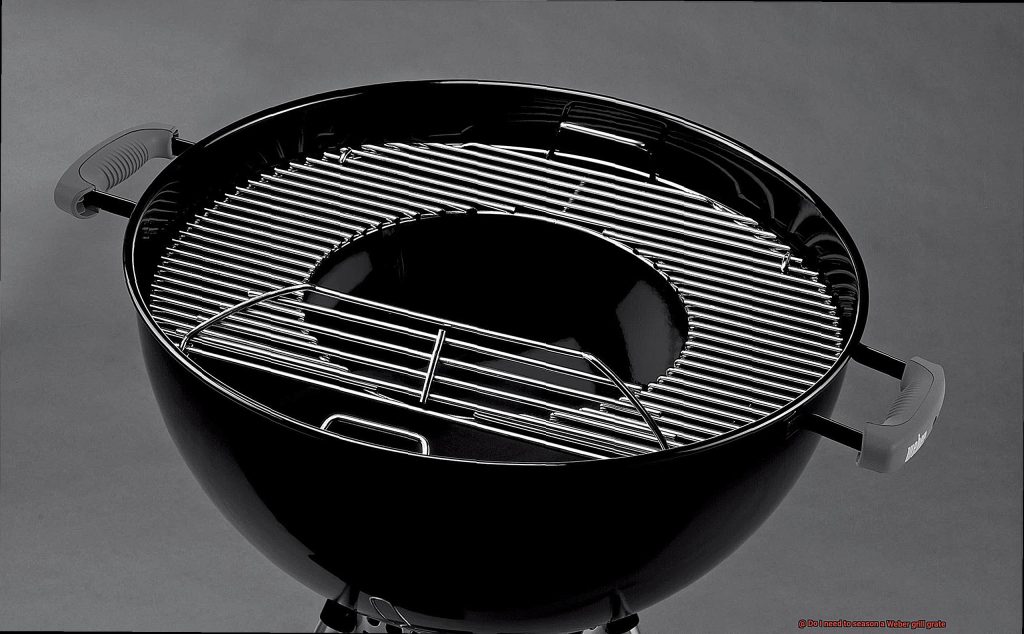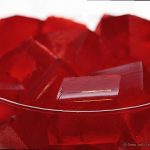When the sun is shining and the birds are singing, there’s nothing quite like firing up the grill and cooking up some juicy burgers or succulent steaks. And when it comes to grilling, Weber is a brand that has earned a reputation for quality and delicious results. But with great grilling power comes great responsibility – namely, taking care of your grill so it can continue to perform at its best.
One question that often arises among Weber grill owners is whether or not they need to season their grill grate. Seasoning involves coating the grate with oil and heating it up to create a non-stick surface that helps prevent food from sticking and makes cleanup easier. Some people swear by this practice, while others argue that it’s unnecessary for Weber grills due to their porcelain enameled surfaces.
So what’s the verdict? In this blog post, we’ll explore the ins and outs of seasoning your Weber grill grate – including whether or not you really need to do it, the benefits of doing so, and how to go about it if you decide it’s worth the effort. We’ll also dive into the science behind seasoning grill grates and whether or not this practice applies universally across all types of grills.
So grab yourself a cold drink, kick back in your favorite lawn chair, and get ready to learn everything you ever wanted to know about seasoning your trusty Weber grill grate.
Contents
Why Should I Season My Weber Grill Grate?
The answer is simple – it’s an essential step that can make a world of difference in your grilling experience.

Firstly, seasoning your Weber grill grate prevents food from sticking. We all know the frustration of trying to flip a burger or chicken breast, only to have it stick and tear apart. By seasoning your grill grate, you create a non-stick surface that ensures your food cooks perfectly without any hassle.
In addition, seasoning your Weber grill grate helps prevent rust and corrosion. If left unseasoned for too long, grill grates are likely to deteriorate due to exposure to moisture and oxygen. Regular seasoning creates a protective barrier, shielding your grill from rust and corrosion.
Another benefit of seasoning your Weber grill grate is its enhanced durability and lifespan. A well-seasoned grill grate can last for years with proper care and maintenance, saving you money in the long run.
So how do you go about seasoning your Weber grill grate? It’s easy. First, ensure that your grill is clean and free of any debris. Next, apply a thin layer of oil like vegetable or canola oil to the entire surface of the grill grate. Use a brush or paper towel to spread the oil evenly over the surface of the grate.
After coating the grate in oil, turn on your grill and set it to high heat. Allow the grill to heat up for around 15-20 minutes or until the oil begins to smoke. Once the oil starts smoking, turn off the heat and let the grill cool down completely.
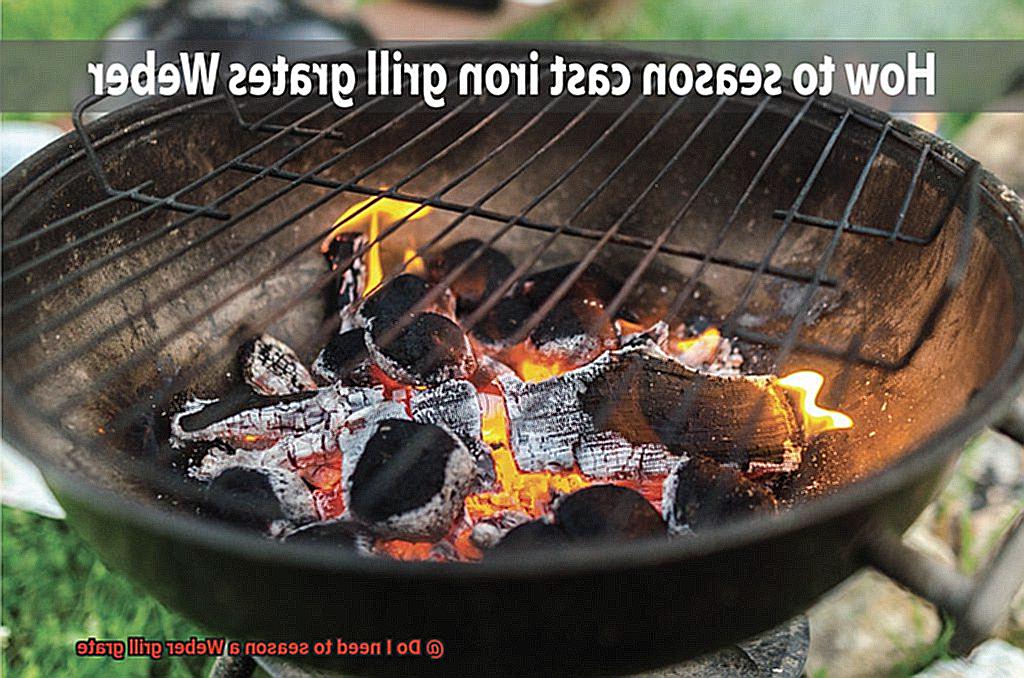
It’s important to note that you will need to reseason your Weber grill grate periodically, especially if you use it frequently. Doing so will ensure that food sticks less and is easier to cook.
What Kind of Oil Should I Use to Season My Weber Grill Grate?
Then it’s time to start thinking about seasoning your Weber grill grate. However, before you grab any old oil, it’s essential to know what kind of oil is best for the job.
First up, we have vegetable or canola oil. These oils are an excellent choice because they have a high smoke point, which means that they won’t burn quickly on the hot grill. Plus, they have a neutral flavor, so you won’t have to worry about any funky tastes making their way into your food.
Looking for something more robust? Flaxseed oil might be your answer. This oil is known for creating an incredibly durable non-stick surface on your grill grate, but it does have a low smoke point. Therefore, it’s not ideal for high-heat cooking. If you’re willing to put in the effort, apply several thin coats of flaxseed oil and let each layer dry entirely before adding another.
Now, some people swear by using bacon grease or lard for seasoning their grill grates. While these fats can undoubtedly add some flavor to your food, they have a low smoke point and can cause flare-ups on the grill. It’s best to avoid using them unless you’re willing to deal with extra cleaning.
Ultimately, the type of oil you choose depends on your personal preference and cooking style. Be sure to avoid oils with low smoke points or strong flavors that could ruin your food or create unnecessary smoke on the grill. A well-seasoned Weber grill grate will make all the difference in your grilling experience, so choose wisely and get ready to cook up some mouth-watering meals.
How to Prepare the Grill for Seasoning
Preparing your Weber grill for seasoning is a crucial step in ensuring that your food doesn’t stick to the grates and that your grill stays in top condition. Here are five easy steps to follow for preparing your Weber grill:
Thoroughly Clean the Grill Grates
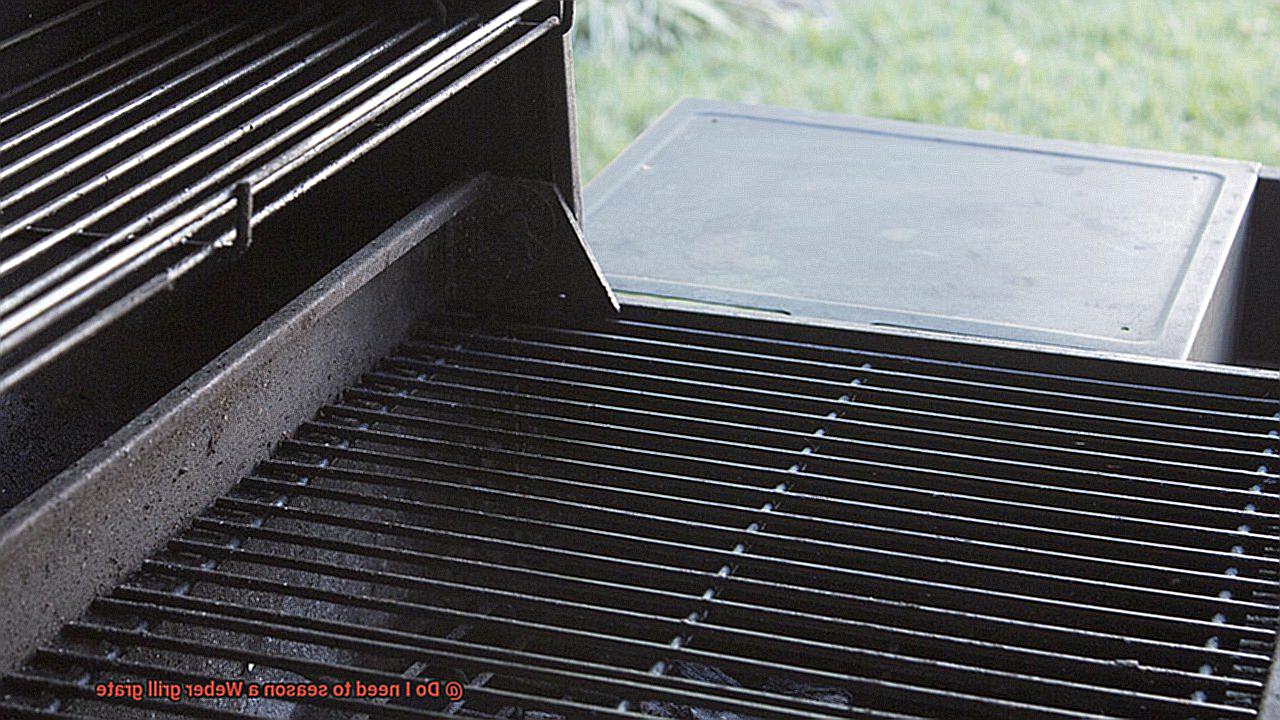
Before seasoning your grill, it’s crucial to clean the grates thoroughly. Use a grill brush or scraper to remove any debris or leftover food particles that may have accumulated. This will guarantee that the oil can penetrate the metal and adhere evenly.
Preheat the Grill
Preheat your grill to a high temperature for around 15-20 minutes. This will help to burn off any remaining debris and sanitize the grates so that you’re starting with a clean slate.
Apply Oil to the Grates
Using a paper towel or brush, spread a thin layer of oil over the grates. It’s recommended to use a high smoke point oil such as canola or grapeseed oil, as this will prevent it from burning and creating an unpleasant taste on your food. Let it sit for 10-15 minutes, allowing it to penetrate the metal.
Heat the Grill Again
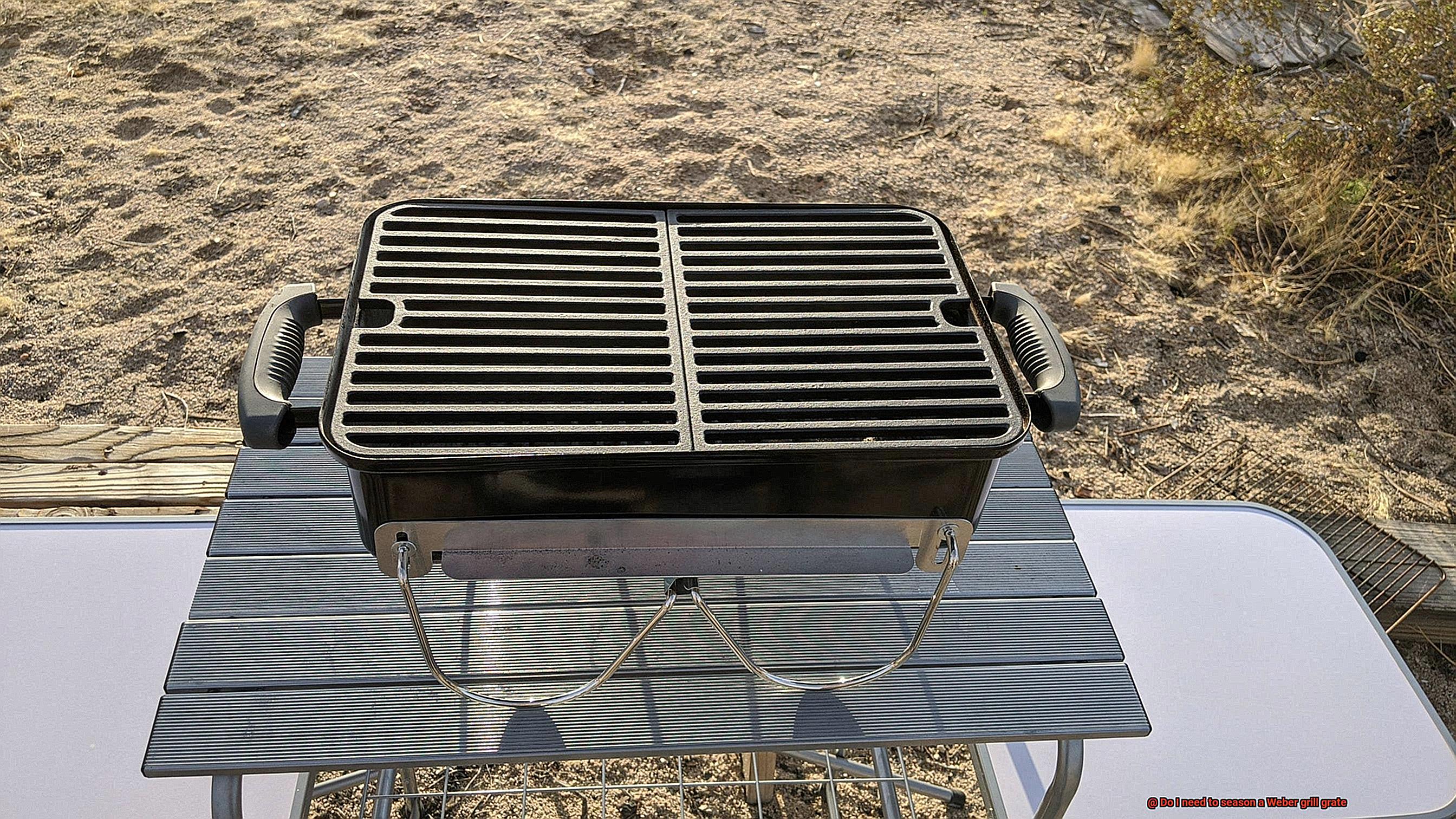
Reheat the grill to a high temperature for another 15-20 minutes. This will seal in the oil and create a non-stick surface on the grates.
Repeat the Process
Repeat this process several times before using your Weber grill for cooking to ensure that the seasoning is properly established and will provide optimal results. You’ll notice that each time you season your grill, it will become easier to clean and maintain.
Step by Step Guide on How to Season Your Weber Grill Grate
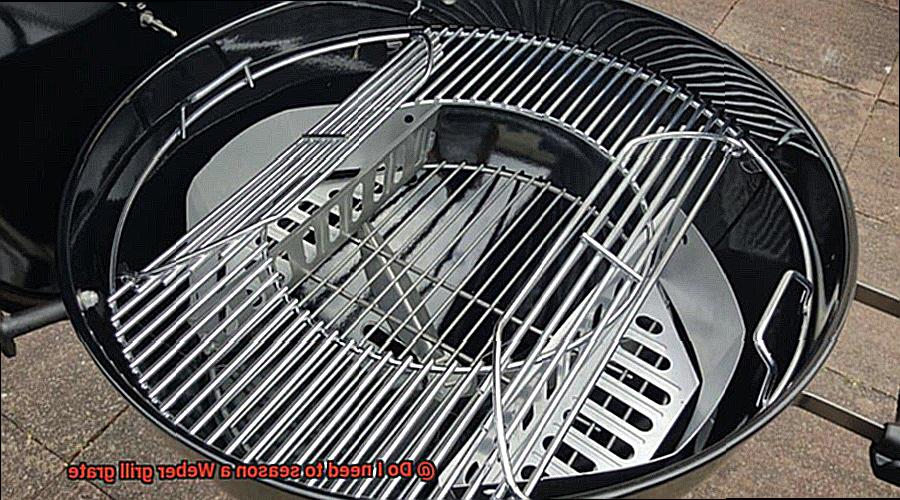
One of the most important things you can do for your Weber grill is to season the grates. Not only does this create a non-stick surface that makes grilling a breeze, but it also protects your grill grates from rust and corrosion.
To get started, gather your supplies – a wire brush, vegetable oil, and a clean rag. Then follow these easy steps:
Step 1: Clean your grill grate
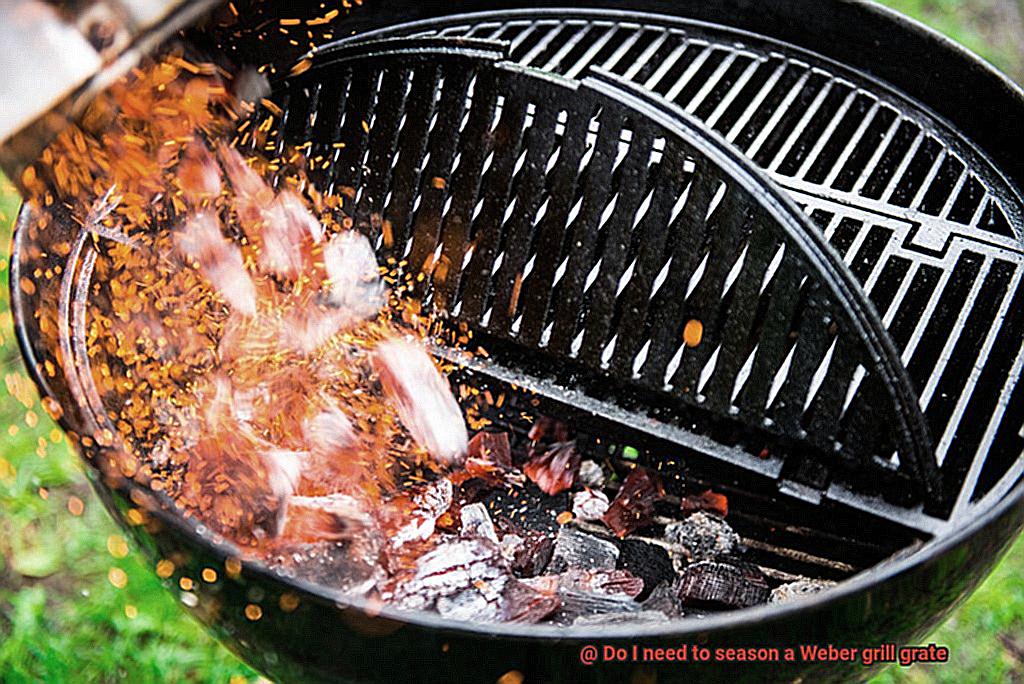
Using a wire brush, scrub away any leftover food debris or buildup on both sides of the grate. A clean surface ensures even seasoning and cooking.
Step 2: Apply oil to the grate
Pour a small amount of vegetable oil onto a clean rag and rub it onto the surface of the grill grate. Make sure you coat the entire surface evenly, but don’t overdo it with the oil – too much can cause flare-ups.
Step 3: Heat up your grill
Turn on your grill and let it heat up for 15-20 minutes. This allows the oil to penetrate the surface of the grill grate and create a non-stick surface.
Step 4: Let it cool down
Once your grill has heated up, turn off the heat and let it cool down before wiping down the grill grate with another clean rag. You’ll notice that the surface of the grill grate now has a shiny, non-stick coating that will make future grilling sessions a breeze.
Step 5: Repeat as necessary
To maintain a non-stick coating on your grill grates, repeat this process every few months or after extensive use.
Benefits of Seasoning Your Weber Grill Grate
That’s right. By seasoning your grill grate, you can enhance the flavor of your food and make the grilling process effortless. Here are some of the benefits of seasoning your Weber grill grate:
Prevents Sticking
There’s nothing worse than having your food stick to the grill, ruining the presentation of your dish and making cleanup a nightmare. Fortunately, seasoning your grill grate with vegetable oil can create a non-stick surface that prevents food from sticking, making grilling easier and more enjoyable.
Protects Against Rust and Corrosion
Over time, exposure to heat, moisture, and food particles can cause rust and corrosion to develop on your grill grate, affecting its performance. By seasoning your grill grate regularly, you can help prevent this from happening and extend the life of your grill. A well-seasoned grill grate is less likely to rust or corrode.
Enhances Flavor
When you season your Weber grill grate with oil, it penetrates the surface of the metal to create a layer that adds flavor to your food. It’s like adding an extra ingredient to your dish. Your steak will have a better sear, chicken will have crispy skin, and vegetables will have a smoky flavor.
Improves Cooking Performance
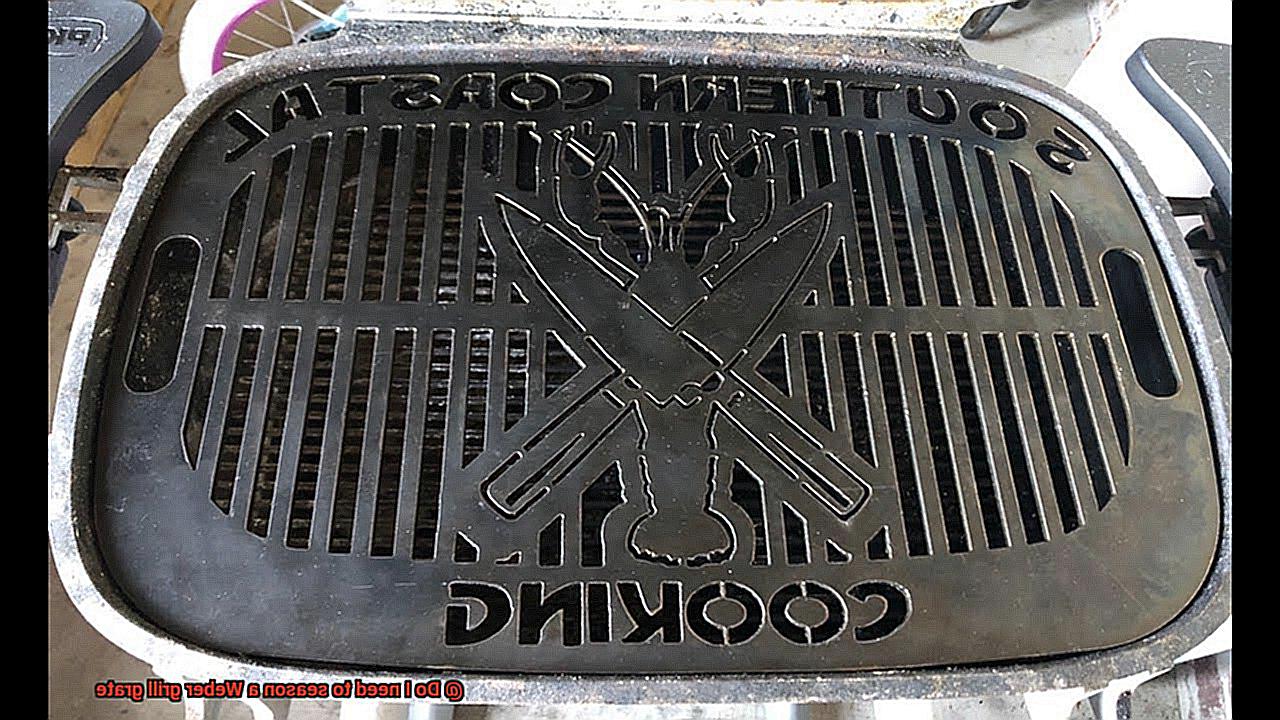
A well-seasoned Weber grill grate distributes heat more evenly, ensuring that your food cooks evenly too. This prevents burning or drying out in certain areas of your dish, resulting in perfectly cooked food every time.
Cleaning and Maintaining a Seasoned Weber Grill Grate
But did you know that proper cleaning and maintenance of your seasoned Weber grill grate is equally important? Let’s dive right in and explore how to keep your grill grate in tip-top shape.
Step 1: Remove Any Remaining Food Debris
After every grilling session, it’s important to clean the grill grate thoroughly. Use a grill brush or scraper to remove any remaining food debris. Not only will this prevent bacteria growth, but it will also help keep your grill grate looking shiny and new.
Step 2: Tackle Tougher Stains with Baking Soda and Water
For those stubborn stains that won’t budge, mix a small amount of baking soda with water to create a paste. Scrub the paste onto the grate using a brush or sponge, then rinse with water. This will help remove any stains without damaging the seasoning.
Step 3: Don’t Overlook the Underside of the Grate and Burner Tubes
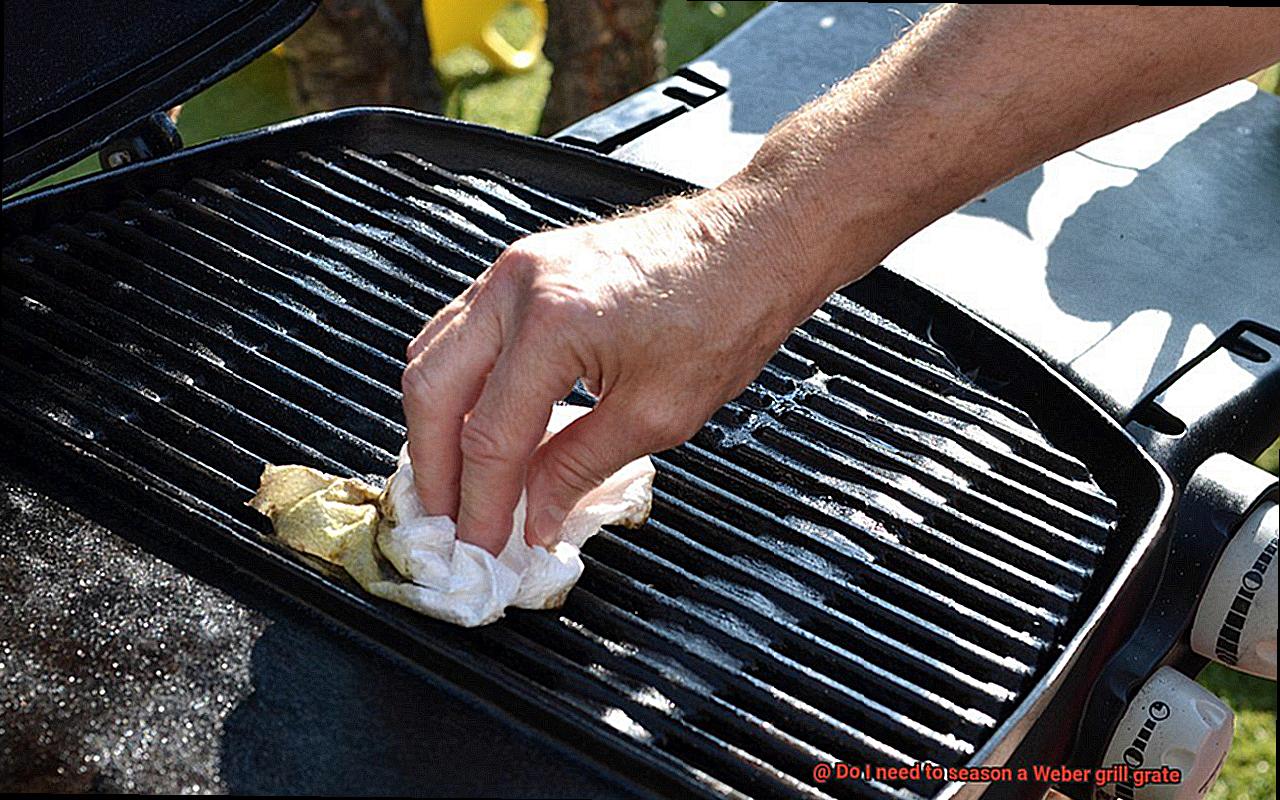
Cleaning the underside of the grate and burner tubes is often overlooked but is crucial for preventing flare-ups caused by grease buildup. Using a scraper or wire brush, gently remove any grease or debris from these areas.
Step 4: Season the Grate with Oil

To maintain the non-stick properties and prevent rust, it’s important to season your grill grate with oil after each cleaning. Simply coat the grate with a high smoke point oil such as canola or vegetable oil, then heat the grill on high for 15-20 minutes. Repeat this process every few uses to maintain the seasoning.
Tips and Tricks for Successfully Seasoning Your Weber Grill Grate
Not only does it prevent food from sticking to the grate, but it also creates a non-stick surface that makes cooking and cleaning easier. Here are five steps to follow for successfully seasoning your Weber grill grate.
Start with a Clean Grill Grate
Before you start seasoning your Weber grill grate, make sure it’s clean. Use a grill brush or scraper to remove any debris or leftover food particles from the last grilling session. This will ensure that the oil can penetrate the metal and create an even coating.
Apply High-Heat Oil
Once your grill is clean, apply a thin layer of high-heat oil such as vegetable or canola oil to the surface of the grate. You can use a paper towel or brush to apply the oil evenly on the grate. This will help prevent rust and extend the life of your grill.
Preheat Your Grill
Preheat your grill to high heat for about 15-20 minutes with the lid closed. This will help to burn off any remaining debris and also help the oil penetrate into the metal. Once your grill has reached the desired temperature, use tongs to wipe off any excess oil with a paper towel.
Repeat the Process
Depending on how often you use your grill, it’s recommended to season your Weber grill grate at least once or twice a year. Repeat the above steps to ensure your grate stays in good condition. Applying multiple layers of oil will create a durable non-stick surface that makes cooking and cleaning much easier.
Avoid Using Soap
After each use, avoid using soap to clean your Weber grill grate as it can strip away the seasoning. Instead, use a wire brush to scrub off any food particles and lightly oil the surface before storing it away. This will help maintain the seasoning and prevent rust from forming.
v2WoiAUlIIE” >
Conclusion
In conclusion, seasoning your Weber grill grate is a vital step in achieving the perfect grilling experience. Not only does it prevent food from sticking to the grates, but it also prolongs the lifespan of your grill by preventing rust and corrosion.
To ensure optimal results, it’s crucial to choose the right oil for seasoning your Weber grill grate. High smoke point oils like vegetable or canola oil are recommended for their ability to withstand high temperatures. For a more durable non-stick surface, flaxseed oil can be used, but it requires several thin coats and has a low smoke point.
Maintaining your seasoned Weber grill grate is equally important. Regularly cleaning any remaining food debris and tackling tough stains with baking soda and water will keep your grill in top condition. Don’t forget to clean the underside of the grate and burner tubes too.
By following these tips and tricks, you’ll be able to achieve mouth-watering meals without any hassle.

